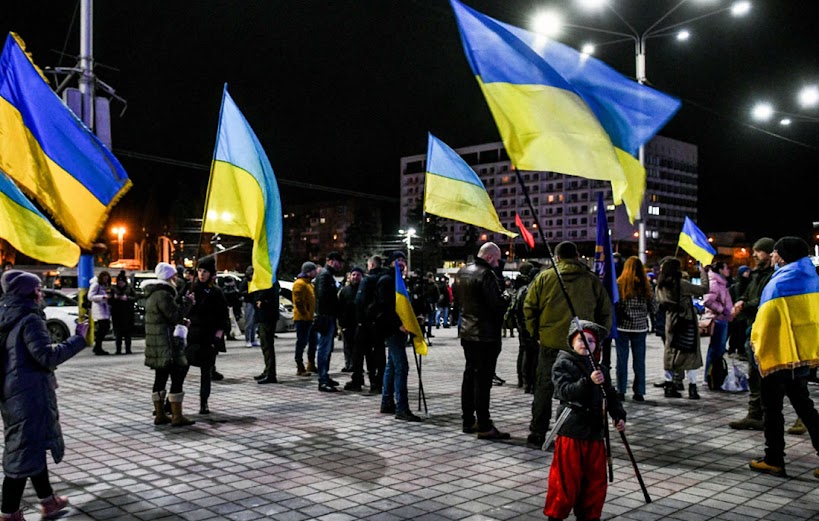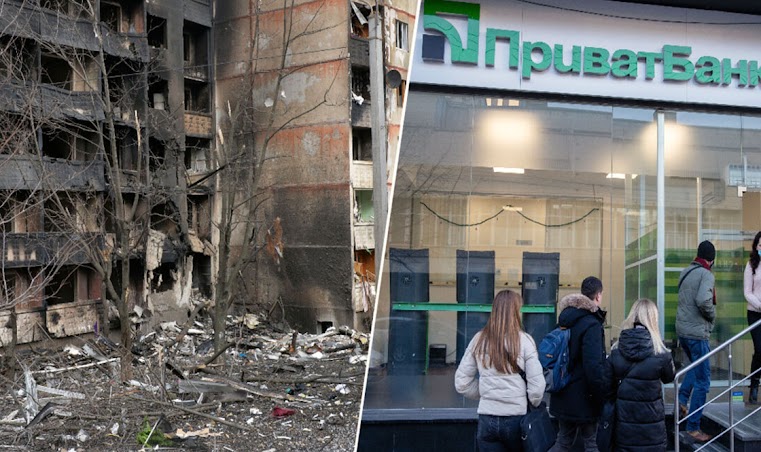Many Ukrainians were displaced during the three-month war. Their home was destroyed by bombing and rocket attacks. Furthermore, many of the destroyed apartments were purchased on credit, and the owners have yet to pay the mortgage on them. The owners of the destroyed houses are now concerned that they will have to return the money to the bank for housing that no longer exists.
And this is correct: a mortgage loan, like any other loan, is repayable. Furthermore, it will have to be returned in any case, explains Lyubov Marchenko for Today. ua.
Lawyers specializing in real estate legal relations told Ukrainians this.
Banks in Ukraine do not forgive debts: What should Ukrainians do with mortgages and other loans during the war?
Banks unlocked all credit cards throughout the war, allowing Ukrainians to freely use borrowed money, including credit limitations. The National Bank urged banks to implement credit vacations, which would allow customers to avoid paying their debts for a set amount of time.
Ukrainian banks offered credit holidays to their customers during the war. Customers will not be held liable for late payments, and they will not be penalized. Credit holidays, on the other hand, refer to the ability to postpone payments on credit cards. Borrowers will still be required to repay their loans, including mortgages, to the banks.
In Ukraine, a special anti-crisis law went into effect on March 17. It was designed to make life easier for consumers with bank loans, such as mortgages, car loans, cash loans, and credit cards.
The algorithm was simple enough for Ukrainians to understand:
- The customer is not liable to the bank for late payments during the period of martial law and for 30 days following its termination or cancellation, and this has no effect on the credit history.
- There is no need to pay a fine, penalty, or any payments as a result of the loan being late.
- Banks were not allowed to raise the interest rate on a loan due to a client's failure to meet contractual requirements.
- It was not believed that interest would be removed for credit funds.
Even if the apartment is demolished, the debt is still being paid back.
You must first register the damaged housing in a particular state register in order to stop paying the debt. The owner of the demolished unit will then be able to file a claim for insurance. He will also be able to repay the bank after receiving money from the insurance company.
As lawyer Tatyana Kozachenko points out, insurance companies typically collaborate with banks. As a result, they frequently return money for destroyed housing to the bank rather than to the client.
"A person's obligation to repay a bank loan does not go away. It's understandable if an insurance company has to pay money directly to the bank for the loss of property. The money will then be refunded to the bank in this section," explains Kozachenko.
Debts aren't going away.
According to Andriy Dubas, President of the Association of Ukrainian Banks, debts will have to be paid regardless of whether the conflict ends or credit holidays are abolished. The banks only granted a respite, not a loan forgiveness, during the martial law period.
Banks went out to meet their customers right at the start of the war. Ukraine's unity paid off. However, the nbu – refinancing will not be able to assist all of them. As a result, we must rely on our own efforts to stay afloat: not just to meet loan commitments, but also to meet deposit obligations. As a market regulator, the central bank is unable to compel banks to extend credit holidays to their consumers. Since 2014, the banking sector has been prepared for shocks, but you must make every effort to repay the debt. I advise people who are now earning money to pay off their debts as soon as possible, - said Dubas.
PrivatBank and monobank, followed by a number of other banks, recently declared that debt will be charged a credit rate beginning in April because they can no longer operate at a loss. True, but just half as much as before the war:
- PrivatBank charges 1.7% credit rate on the balance of funds.
- monobank – 1.6%.
Settlers' requirements.
Customers are not subject to any penalty. Banks, on the other hand, do not lend money for little purchases; such programs have been halted since the conflict began. As a result, Ukrainians are unable to borrow money to purchase items such as appliances for their homes. True, a service like this would be useful right now for many refugees.
A difficulty with the mortgage loan has arisen for many settlers. The attackers' shells destroyed tens of thousands of homes across Ukraine. The owners of the mortgaged flats that were destroyed are debating whether or not to pay back the mortgage.
Lawyers point out that even if the building is bombed, the loan payment will continue. Legally terminating the mortgage through state registration in the manner prescribed by law is required. The case should then be turned over to the insurance company.
That is, if your house is bombed and you have a mortgage, you are entitled to compensation from the insurance company. So, pay the bank.
Insurance companies collaborate with banks, according to lawyer Tatyana Kozachenko. And if they need to return money to someone and have the opportunity to do so, they will.
The responsibility of a person to repay a bank loan does not go away. It's evident if the insurance company must compensate for property destruction by sending money immediately to the bank. The money will then be repaid to the bank in this section," kozachenko explained.'
Mechanisms' time of operation.
Lawyers suggest that after the war, the issue of mortgages in Russian-occupied cities will need to be resolved at the legislative level. These loans should be able to be written off or restructured as a result of the initiatives. The National Bank is now working on a similar method, but plans to return to it after martial law is lifted.
According to NBU Chairman Kirill Shevchenko, if a person has lost his home due to a mortgage, a general approach cannot be used and he must be left alone to deal with his difficulties.
Through Diya, Ukrainians can now claim for compensation for property destroyed or lost as a result of the war; over 66,000 applications have already been submitted. It's all about:
- Private manor, country or garden houses.
- Apartments.
- Other residential premises (for which a separate ownership right is registered, and not as part of the house).
Log in and pick the "Services" tab, then the "Damaged property" area. Then you must complete an application that includes information on the object, images and videos of the damage, and the applicant's contact information.
We already discussed how businesses might pay lower taxes while remaining profitable throughout the war. Find out how the Ukrainian government intends to compensate them for their ruined apartments.
Everything will be different after the war.
However, these mechanisms for compensating for lost housing were developed and adapted during times of peace, when insured events were isolated. There are many such cases in the country right now as a result of the war. Obviously, the payment mechanism will be different here. A new legal mechanism for the repayment of mortgage loans for destroyed houses will need to be developed and implemented.
After the war, the National Bank promises to resolve this issue. Kirill Shevchenko, the head of the NBU, believes that borrowers who have lost their homes should not be forced to repay loans in accordance with the widely accepted scheme. And you cannot abandon them in the midst of their difficulties.
Has the EU found a solution to Ukraine's money crisis?
Many of the 4 million Ukrainian refugees brought cash with them to Europe. Until now, banks have refused to accept their national currency.
To protect the country's foreign exchange reserves, the National Bank of Ukraine has suspended the exchange of hryvnias into foreign cash since the beginning of the war. This has limited the ability of European banks to convert the currency into dollars or euros. Swapping hryvnias also entails a substantial financial risk.
Can Ukrainian refugees withdraw money from their bank accounts?
The EBA urges financial institutions to provide such access. "For example, banks do not have to require a passport to open a basic account and can rely on other documentation to prove that a prospective customer is a Ukrainian refugee," the Paris-based authority stated.












0 Comments
please do not enter any spam link in the comment box